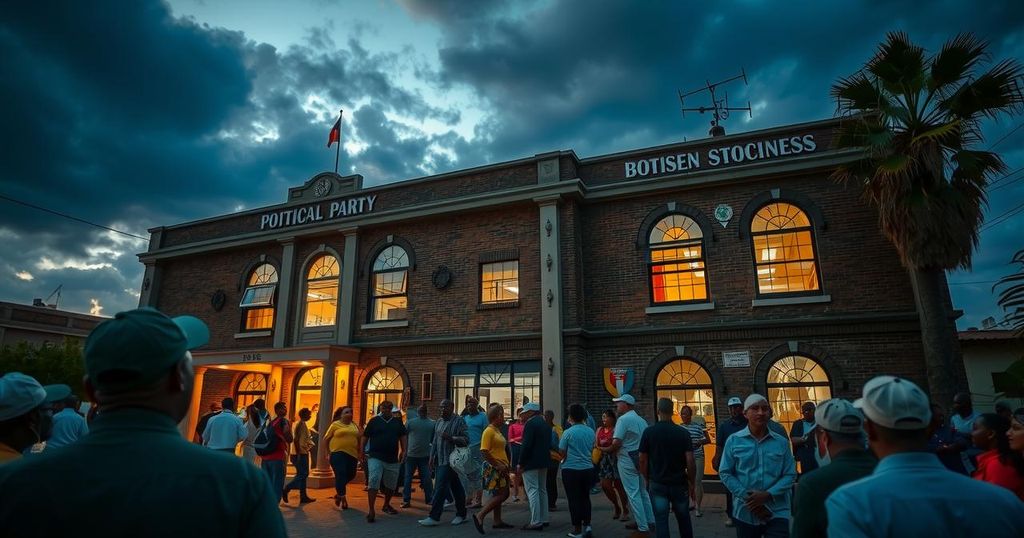A Dramatic Shift in Botswana’s Political Landscape: The UDC Emerges Victorious Against the BDP

The Botswana Democratic Party (BDP), in power since independence in 1966, faced a historic defeat in the recent elections, losing to the opposition Umbrella for Democratic Change (UDC), led by Duma Boko. The shift reflects public discontent over economic issues, particularly rising unemployment and a dependence on diamond exports. This election marks a significant change in Botswana’s political landscape, as the UDC promises to address the nation’s economic challenges and create jobs.
In a remarkable political upheaval, the Botswana Democratic Party (BDP), a dominant political force in Botswana since the country’s independence in 1966, has been unseated from power following a significant electoral defeat. The recent elections saw the emergence of the Umbrella for Democratic Change (UDC) as the new governing party, with Duma Boko at the helm as its presidential candidate. This transition signifies a crucial turning point in Botswana’s democratic history, particularly as the nation confronts pressing economic issues and the desire for economic diversification. The electoral results revealed a populace increasingly dissatisfied with the long-standing governance of the BDP, evidenced by the opposition’s capture of 28 out of 61 parliamentary seats, surpassing the BDP’s historical hold on the government. The BDP’s decline can be attributed to a multitude of factors, with the downturn in global diamond demand being a primary impetus. Botswana, known for its diamond production—accounting for over 80 percent of its exports and a quarter of its GDP—has felt the adverse economic effects of declining prices and sales, leading to soaring unemployment rates, particularly among the youth, which exceeded 27 percent. Criticism toward President Mokgweetsi Masisi’s administration intensified as it struggled to pivot the economy away from its reliance on diamond mining. The president acknowledged the need for policy shifts during his electoral campaign, yet many citizens perceived the government’s response to the economic crisis as insufficient. Bongani Malunga, a political analyst, asserted that the BDP lost the election due to its negligence of the pressing needs of the populace. He stated, “BDF lost power due to a few factors. The first one would be unemployment. There is a high unemployment rate in the country. A lot of the youth are frustrated.” Moreover, issues in the healthcare sector and low minimum wages further fueled public discontent, as essential services remained out of reach for many. The opposition capitalized on these grievances, effectively presenting their vision for a renewed government focused on economic revitalization. Duma Boko, a seasoned politician and former Leader of the Opposition, utilized the public’s frustrations to rally support for the UDC, pledging initiatives aimed at job creation and educational investment. After the election results were announced, President Masisi publicly acknowledged the BDP’s missteps, stating, “We got it wrong big time in the eyes of the people.” He expressed a clear understanding that the ruling party had lost touch with the electorate’s needs. While some analysts argue that it may be unjust to attribute all the blame to the BDP, it remains evident that the party failed in its promise to improve the lives of its citizens, as the UDC presented more resonant policies that better aligned with the everyday struggles of Batswana. With the new government in place, hopes are high for a strategic focus on addressing youth unemployment and economic diversification, restoring faith in Botswana’s political landscape.
The article discusses the significant electoral upset in Botswana’s governance, where the ruling Botswana Democratic Party (BDP) was defeated after decades of control. Contextually, Botswana gained independence from Britain in 1966 and has enjoyed political stability and economic growth driven largely by its diamond resources. However, recent economic challenges, particularly a decline in diamond prices and increasing unemployment, led to rising public discontent. The emergence of the Umbrella for Democratic Change (UDC) as a coalition of opposition parties marked a pivotal shift in the country’s political landscape, highlighting the populace’s demand for change and economic reform.
The electoral defeat of the Botswana Democratic Party underscores a critical moment in the political evolution of Botswana. Discontent with the government’s inability to address economic challenges and provide essential services spurred voters toward the opposition, which articulated a more relevant vision for the future. With new leadership under the UDC, the nation looks forward to potential reforms that prioritize economic diversification and job creation to better serve its citizens.
Original Source: www.theeastafrican.co.ke






